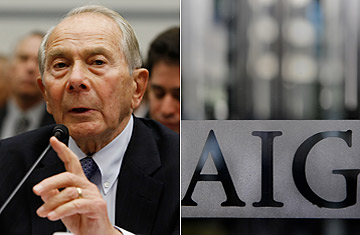
AIG and Maurice "Hank" Greenberg, in their latest legal fight, seem both to be hoping that they can convince a judge and a jury that the ends justify the means, and perhaps also that they are the nicer of the two parties.
The insurance company and its former CEO head to court on Monday in a tussle over who should be allowed to keep hundreds of millions of shares of AIG that Greenberg and a company he controls, Starr International, took when he left his former employer. AIG says those shares and the more than $4 billion in profits Starr International has reaped from past stock sales are the property of the insurer and its employees. But rather than fight over the merits of the case, both sides have spent the past few weeks arguing that they should win because what they plan to do with the money is more worthy than what the other side has planned. "You do see this sort of thing in cases that involve people with dubious reputations in the public eye," says James Cox, a law professor at Duke University. "And I do think a desire to improve his public reputation is what is driving Greenberg in this case."
Last week, AIG for the first time said that if it wins it plans to use the money to pay back taxpayers (AIG has received more than $170 billion in government assistance). Previously, the company had suggested that the missing shares should be used to compensate employees. Greenberg's Starr, for its part, has recently been beefing up its credentials as a charity. In the past few weeks, Starr has given out $1.5 million to antihunger and homeless causes in the New York City area. Starr is owned by a nonprofit (thus, it thinks of itself as a charity,) but it only made its first charitable donation in 2006.
The complicated case stems from the departure of Greenberg in 2005, when he was ousted from AIG, a company he ran for 37 years, amid an accounting scandal. While the case gets at the wacky bonuses and compensation structure present at AIG for years, the facts of it predates the mortgage mess and the company's current troubles.
Here, in a nutshell, is the source of the current disagreement. Back in 2005, Greenberg was the head of both AIG and Starr International, a private insurance company whose main asset was nearly 300 million shares of AIG. For years, Starr had used that stock to dole out retention bonuses to AIG executives. When AIG booted Greenberg, he seized control of Starr and its AIG shares. Greenberg says Starr is a separate company that was set up to use its shares to benefit a charitable trust, and insists it can do what it wants with the shares. AIG says Starr was given those shares with the understanding that they would eventually be returned to AIG and its employees.
The stakes in the case have only increased now that AIG's fortunes have plummeted in the financial crisis. AIG's market capitalization has plunged 95% in the past year to a recent $4.3 billion. That means, should AIG be able to recapture it, the trove of cash and assets sitting at Starr, which has collected $4 billion from selling AIG shares in the past few years, could end up being one of AIG most valuable assets. That has made the mudslinging all the more intense.
A spokesperson for AIG says the idea that Starr is a charity is a sham, noting that Greenberg's company in all the years of its existence has donated less than 0.01% of its worth. "Only after AIG brought this action did SICO [Starr International] suddenly and cynically show charitable tendencies," says the spokesman. "Mr. Greenberg is dressing up SICO in a veneer of philanthropy just like a defendant who buys a new suit for the courtroom."
Greenberg and Starr say that AIG should not be believed when it says it is pursuing the lawsuit on behalf of shareholders or taxpayers. In a recent e-mail to a blogger, a Starr spokesperson wrote, "By its own admission, AIG is prosecuting these claims for only one purpose: To add hundreds of millions of dollars to a bonus pool available to AIG's top 700 executives."
Both sides say they have been consistent in their reasons for pursuing the case, and that the other side is mischaracterizing their intentions. A spokesman for AIG says, "We have not changed a whit our determination to restore to the trust that which was wrongfully taken from it." In this whole disagreement, of course, one thing is certain: There are likely to be some fireworks when this case begins on Monday.
